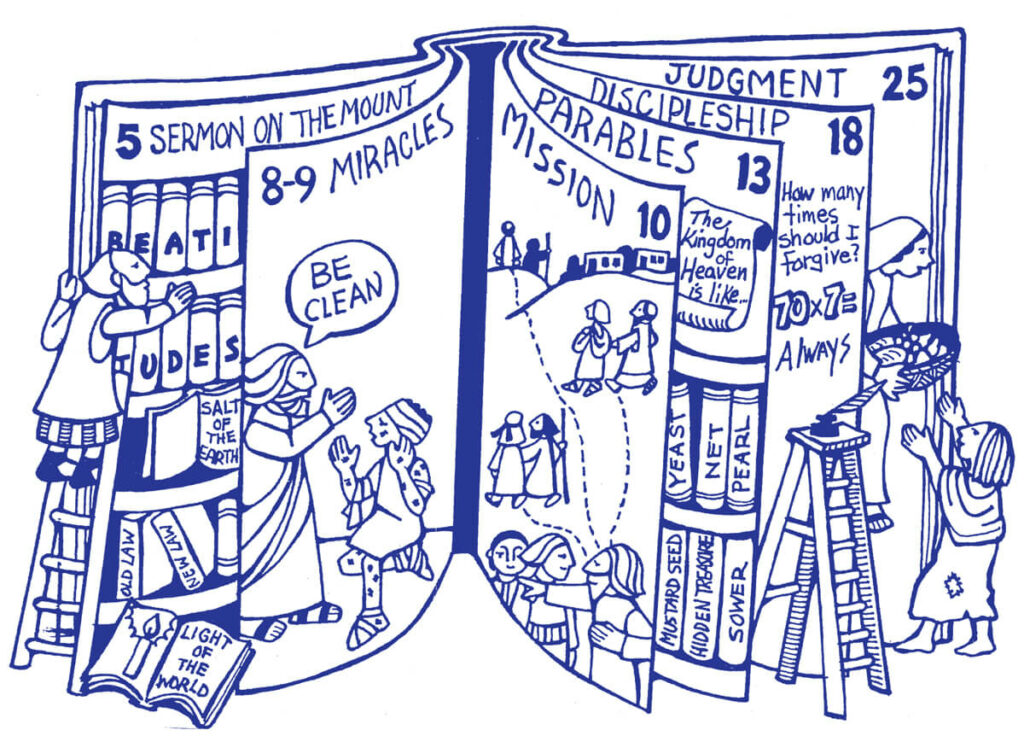During the Cycle A Sundays in Ordinary Time, the Church reads semi-continuously from Matthew’s gospel. Matthew organizes his gospel as a manual for the growth and life of the community for whom he writes in the A.D. 80s.
Matthew follows the broad plot of Mark’s gospel, the first gospel to be written. Jesus’ baptism is the beginning of his public ministry; his death and resurrection, the end. Within this plot, Matthew organizes Jesus’ words and deeds into distinctive sections as one might catalog a library.
Matthew groups many of Jesus’ sayings in chapters 5-7 in the setting of a Sermon on the Mount. Here the reader finds the beatitudes, the golden rule, the imperatives to turn the other cheek and love our enemies.
In chapters 8-9 Matthew groups miracle stories. Jesus heals the sick and frees people from demons. Following these stories of Jesus’ deeds, Matthew organizes a section for those whom Jesus commissions to take up his work; this is chapter 10, the missionary discourse.
In chapter 10, Jesus commissions 12 disciples to do what he had been doing—healing and freeing people, bringing the kingdom of God into people’s lives. In Matthew 10.5-42, Jesus instructs these missionaries to expect their lives to be no different from his. These instructions come to us as sayings. Many of these sayings anticipate that missionaries and disciples will experience the same conflict and persecution Jesus did.
- When did you begin to take your mission to live and teach as Jesus did seriously?
- Who was your inspiration?

Jesus’ missionary sayings assume his disciples may suffer rejection as he did, but they counter this cost of discipleship with three reasons for courage. First, Jesus’ teachings are not the esoteric secrets of an elite inner circle. Jesus publicly teaches ordinary men and women in his ministry and calls disciples, who are ordinary people, to do the same.
Second, missionaries should fear physical death less than despair and death of the spirit. This latter possibility exists for those who do not respond to the Spirit’s promptings in their deepest selves. Death of the spirit, the worst end of Christian life, is within every disciple’s power to prevent.
Third, Jesus urges us to affirm that God cares for even the most common and seemingly expendable of birds, the sparrow. By getting the hearer to affirm the worth of sparrows, the saying sets us up to recognize how much more valuable is every ordinary, human person.
- What deadens your spirit?
- What is the importance of ordinary people as Christian disciples today?
- How can living the golden rule help stabilize our volitile world today?

The final saying in Sunday’s gospel sums up the rest. It turns on the principle of reciprocity. Jesus will acknowledge us before God as we acknowledge Jesus before others. This saying challenges us to be public witnesses of Jesus’ healing and freeing love in our lives.
The early Christians lived in the shadow of the Roman Empire, which considered their faith illegal. Today Christians live in a capitalist economy gone global that considers religion irrelevant. The revenue of many multi-national corporations rivals the gross national product of nation states. However, corporations have no obligation to uphold Christian values or human rights as nations do, only to profit stockholders.
When companies downsize or move to secure cheaper workers, some CEOs see leaving people out of work, without insurance, and unable to pay mortgages as “just business.” They take huge salaries and bonuses for their work. They see no incongruity between how they treat employees and how they treat themselves. Other CEOs and managers help workers make transitions when businesses shrink.
Catholic social teaching challenges us to live our Christian values in our public and corporate lives. People are not commodities; they have dignity and rights, including the right to a just and livable wage. Work takes its dignity from the human beings who do it.
- What gospel principles do you practice in your public life? In your business life?
- In what practical ways do you seek to put Catholic social teaching to work in public policies?
- What groups do you work with to build up our civic community? If none, what groups might interest you?
